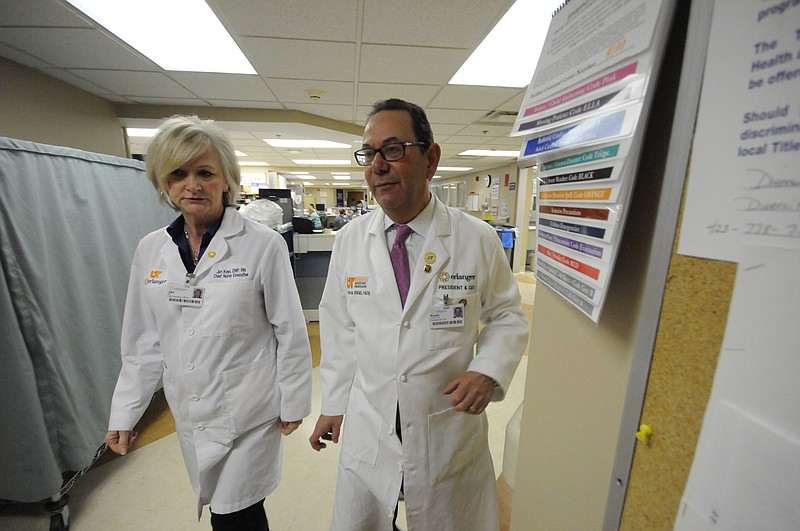NASHVILLE - Five former board members for two Chattanooga community health centers charge that Erlanger Health System CEO Kevin Spiegel and the public hospital's board had no legal right under federal regulations to fire four top administrators and move to dissolve the health centers' governing board.
Members of the Southside/Dodson Avenue Community Health Centers board also defended former Executive Director Will McMinnis, saying he brought "multiple solutions" to address operational financial problems that existed long before he arrived.
But, the former board members charged in a joint statement, most of McMinnis' proposals were "rejected by Erlanger, who at most times [was] operating in its best interests, as one would expect, at cost and detriment to the Centers."
The bottom line, they say, is "the issue between the two Boards and the executive team of Centers was not one of poor management on the part of Mr. McInnis and his executive team, but rather Erlanger's unwillingness to accept the independent authority of the governing board," they said.
Spiegel, however, defended the moves as necessary in an email to the Times Free Press. Erlanger, he said, "had the obligation, the legal right and fiduciary responsibility to undertake the recent changes at the centers.
"All of Erlanger's actions were taken to protect the interests of the patients and the community we serve and not that of a board," Spiegel added.
The competing narratives stem from Spiegel's Aug. 11 announcement that Erlanger was dismissing McMinnis and three other top executives amid escalating losses at the two centers, which treat uninsured or underinsured Chattanoogans.
Others dismissed were Albert Barnett, finance director; Aaron Maxey, compliance and quality manager; and Glenna Lawrimore, health center operations manager.
At the time, Spiegel said Erlanger's board was also moving to dissolve its co-applicant agreement with the health centers' community board. That serves as the basis for the $2.3 million grant the centers receive from the U.S. Health Resources and Services Administration as federally qualified health centers.
A public hospital that treats many of the area's poorest, as well as maintaining a base of paying patients, Erlanger says it lost $2.3 million in the last fiscal year to shore up financial support for the centers. The centers provide primary health care and dental services that help many in the Alton Park and Dodson Avenue areas receive consistent health care and avoid coming into Erlanger's emergency room for much more costly treatment.
Spiegel has repeatedly emphasized that Erlanger remains committed to the centers and will continue to operate them.
Before the announcement, Spiegel said, he and other Erlanger officials met with federal HRSA officials in Washington. The agency has agreed to continue this year's grant funding through March 2016, he said, but the centers face loss of federal funds following that.
Spiegel has said Erlanger is willing to go it alone if necessary and even make improvements.
Former board members signing the news release include Carmen Ware, Cora Lanier, Felix Beasley, Maeola Shropshire and Robert Shaw. They indicated they don't intend to fight Erlanger's action but want to set the public record straight.
"We just want the truth out there as to what happened," Lanier said in an interview. "We want them to be honest to why this split occurred. They did not allow us to have board authority."
Former board members point to Section III.D of a 2014 HRSA Policy Information Notice. It states: "No other entity may have an overriding approval authority over the health center board."
An earlier section detailing the governing board's responsibilities includes "approving the selection/dismissal and evaluating the performance of the health center's CEO or Executive Director."
In his email, Spiegel said Erlanger's HRSA grant helped fund some of the centers' expenses but even so operational costs "far exceeded revenues amounting to more than $2 million last year."
Former board members counter that Erlanger's expenditures only accounted for a quarter of their operational costs. They also say the centers annually save the hospital millions of dollars in emergency room expenses by providing less-costly primary care and dental services.
At least 51 percent of the board's membership is comprised of people served by the centers, under federal requirements.
In an interview, former finance director Barnett said there were several things that could have eased financial issues for the centers. But he said Erlanger proved unwilling to make changes. For example, he said, there were "issues" with the Erlanger-designated company that performed billing services for both the hospital and the centers. Erlanger wouldn't allow the centers' board to contract with someone else, he said.
And Barnett said that, while free-standing health centers can contract with outside pharmacies and benefit from a federal program involving discounted prescription costs for them while providing more revenue from insured patients, Erlanger retained its own control of the program.
This was not, Barnett said, an issue of health center management acting irresponsibly or spending money that should not have been spent. He also noted the health centers have been losing money since 2004 when then-Gov. Phil Bredesen began disenrolling some 180,000 people statewide from TennCare.
"Everything that we proposed, Erlanger blocked it," Lanier said. "Ultimately, they evidently wanted this outcome."
But Spiegel said Erlanger's leadership team "worked diligently with the health center's management team to address issues related to leadership and governance of the centers. Unfortunately, Erlanger's repeated efforts to collaboratively address those issues did not yield meaningful results."
He said that "to resolve this untenable situation, Erlanger's leadership team met with HRSA officials this month to address issues of concern and lay out an alternative plan to ensure the future success of the health centers.
"Officials with HRSA understood the challenges Erlanger faced, approved the alternative business model and offered to continue to grant funding through March 2016," Spiegel said.
"Erlanger takes its mission seriously and will continue to fund and make improvements to the health centers," he said.
Contact staff writer Andy Sher at 615-255-0550 or asher@timesfreepress.com.
Contact staff writer Yolanda Putman at 423-757-6431 or yputman@timesfreepress.com.

